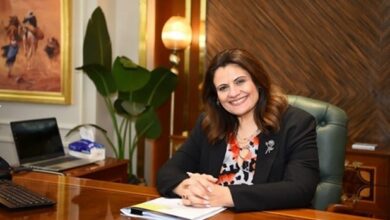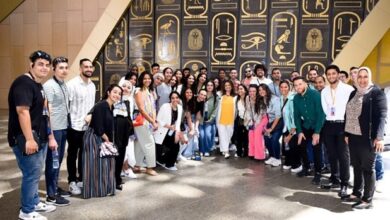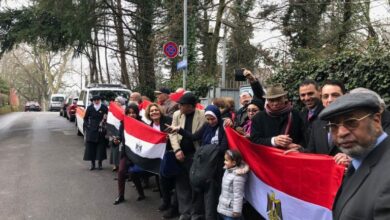After the incident in Mahalla as well as the ongoing NGO crisis, to say nothing of xenophobic acts being reported in day-to-day life, it’s easy for Egypt's foreigners to fall into a sort of unease, as we panic about what our roles here might be in a time of great uncertainty. Like many in my community, I don't want to leave Cairo. I think of it as my home both now and in childhood, and the thought of maybe having to leave at some point in the future is gut-wrenching. The culture of rumors is at an all-time high in the midst of the unrest, and all over — in smoky bars and in online forums — the fear of the unknown, the worry of Egypt changing and becoming an unwelcome and indifferent host, at times reaches shrill, near-hysterical levels. It’s easy to fall prey to it, and easier still to forget the small but meaningful daily acts that help to constitute a community here. Sometimes, it takes trauma to recognize just how meaningful community can be in Cairo.
The first thing I did the morning after the Port Said tragedy was stock up on food. November's events on Mohamed Mahmoud had come seemingly at random and back then I found myself stranded, with cat, in an apartment in Talaat Harb, anxiously watching Al-Jazeera Mubasher and chain-smoking as I wondered whether or not this new strain of gas was going to saturate my apartment and asphyxiate the one living being that I loved more than myself. This time, I told myself, I wouldn't be such a fool. I bustled about the neighborhood, collecting goods from the twins at the nut shop on Noubar, from my favorite wholesale vendor in the Bab al-Louq souq, fetching cans of beans at the Isis shop. Like me, the rest of the neighborhood was anticipating something. We all knew what was inevitable, we would continue on with our business, albeit briskly, until the time came. I got home, put on a pot of tea, unearthed my 15LE gas mask, sat on my balcony and waited. My neighbors waited too. Downstairs, my neighbor smiled and shrugged as if to say, "Here we go again," and across the street the young boys who live on the building's rooftop pulled out their Ahly banners and waved them as the Ultras' march approached us.
My flat is situated just above the famous (or infamous, to some) Macarona Reda and boasts a sizable community of residents and workers. In addition to the restaurant, there are two family-owned and run kiosks, the proprietors of which also live on the rooftop and act as de facto bowabs. The building has always had a family-oriented air about it, its denizens welcoming my parents and siblings graciously when they came to visit me in December. My flat is everything I could dream of, save its water pressure and uneasy proximity to the Interior Ministry, aggressively dominating my beautiful view with an ominous black flag and an unearthly shade of pink. As the front lines made themselves apparent on the night of 2 February, I felt a heavy relief that I was situated on the protesters' side; six months ago, I would have been in a building on Noubar, uneasily watching policemen fire tear gas canisters and retreat.
Macarona Reda's co-owner, moonlighting as my landlord, is nothing if not a good businessman, and so on Thursday the restaurant's twofold role became apparent as both building security and supplier of sustenance to young revolutionaries. Every time I had a visitor I would traipse down nine flights of gas-saturated stairs and unlock the heavy iron gate, assuring whoever was on duty as de facto guard that yes, he was my friend and no, he was not taking pictures. The building became its own ecosystem, mirroring the triage efforts happening in the outside world. As I rushed up and down nine flights of stairs to let visitors in from the fray, I'd often run by one of the kiosk owners. We'd wave wordlessly to each other and continue with our duties.
It always seems a little misguided to me when people speak of a security vacuum in post-uprising Egypt, for truly, under the Mubarak regime there always seemed a kind of suspicious kindness, as though anyone might smile and offer tea to your face and then rat on you behind your back. True, during my tenure in Cairo I generally feel a stronger sense of immediate community than in any other city, but now more than ever it seems stronger than any semblance of community I had prior to the uprising. On Monday afternoon, feeling a little stir-crazy, I decided to shrug off the consistent bombardment of tear gas and leave Bab al-Louq for a few hours. As I left my building, my favorite employees of Macarona Reda cautioned me to be careful and made sure I'd wrapped my scarf around my face. As I scurried down the street, eyes watering, I ran into my fruit vendor, who yelled to me to be careful. As I reached Midan Falaky, amidst the fray I was greeted with warnings, not to keep out or to go away, but to be careful. One young protester emerged and helpfully sprayed saline solution in my eyes, and I waved my thanks and continued on my merry way. Two blocks north, no longer affected by tear gas, traffic continued as usual, businessmen walked to work, a young guy shouted, "Welcome!" in my ear. I promptly burst into non-gas-induced tears. Two blocks north, I suddenly felt much less safe, as though my community —which had stayed together both in the midst of trauma and outside of it — had evaporated.



